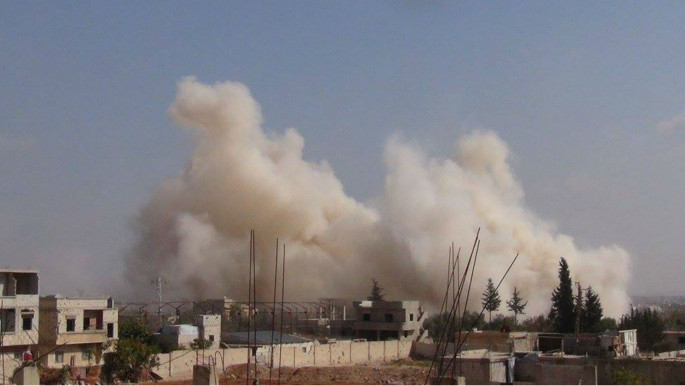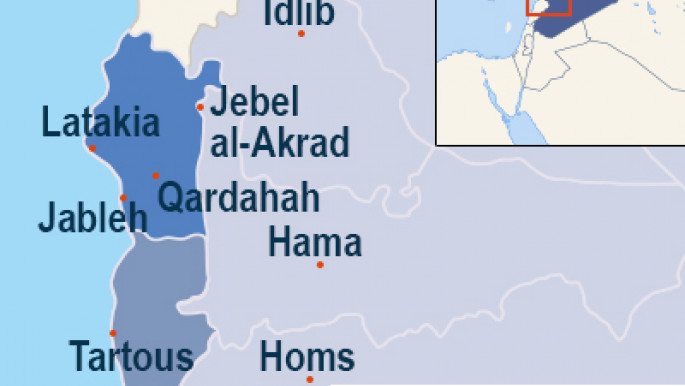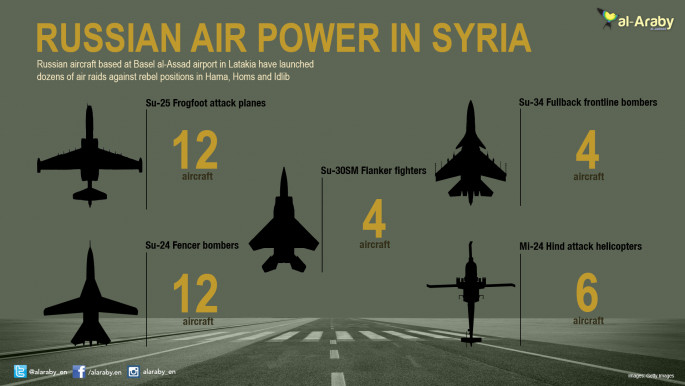Turkey v Russia: Syrians will be the losers
While the eyes of the world are fixed on the escalating war of words between Moscow and Ankara, the people of Syria are waiting for real Russian bombs to rain down on them.
Turkey will undoubtedly be hit with economic sanctions by a belligerent Russian government, but will probably understand that President Vladimir Putin is unlikely to launch any form of military action against it.
The two countries are also too economically interlinked for divisions to last.
Syrian activists fear that Moscow will instead direct its ire at the Syrian people in rebel-held territories.
There is growing anger on the Russian streets about the downing of a Russian jet leading to the death of the pilot and thr killing of a marine on a rescue mission - and many want blood.
Revenge attacks
Russia has already launched a series of revenge attacks on Turkmen villages close to the Turkish border.
The Syrian opposition's interim government in the area opened a refugee camp in Latakia province to house civilians fleeing the bombing and expect many more to come.
"Syrian civilians are being targeted by Russia already but
if we look at the way Russia operates, I do fear that it is revenge, so to speak," said Sam Charles Hamad, a writer of Middle East affairs.
"They will want to hammer the rebels, particularly Turkish-armed ones all across the north, and not just in Latakia."
Among the groups most likely to be targeted are the Syrian Turkmen Brigades from the Free Syrian Army.
These men have been based in the mountains of northern Latakia since the near-start of the armed conflict and were responsible for at least one of the Russian dead.
| Read more: Who are the Turkmen? |
In recent days, they have been fighting off a regime-Hizballah offensive on their territories which is backed by heavy Russian bombing.
The presence of this rebel brigade in Assad's ancestral province brings home an existential crisis for the regime.
Since protests began, they have been determined to wipe out all forms of resistance in its heartlands.
So far, the Syrian army and Hizballah militias have been unable to defeat the rebels operating from defensive positions in Jebel Turkman and Jebal al-Akrad, in the far north of Latakia.
 |
| Another bomb hits rebel-held Moadamiyeh in the Damascus suburbs [Moadamiyeh Media Centre] |
Jaish al-Fatah's capture of Idlib province, which borders Latakia, earlier this year, has also heaped pressure on the regime.
Damascus appears resolute in protecting Alawite supporters in Latakia and ensuring the stability of its mixed Sunni-Alawite provincial capital.
Rebel rockets from the Nusra Front and other extremist groups have been hitting Latakia's villages and provincial capital with increasing accuracy.
Russia will also be determined to protect its military interests in the province.
"The Syrian Turkmen Brigades of the FSA are obviously partly based in Latakia. So that immediately troubles Russia, given the entire reason for their intervention is to ensure the survival of the Baathist rump," said Hamed.
"So, the presence of a rebel force in Latakia, one rather well armed by Turkey, is a major problem for the regime and Russia. And Latakia and Tartous are the two areas in Syria that Assad needs to hold. Rebels taking these two areas would be curtains for Assad."
Scorched earth
Russia's counter-terrorism strategy is largely a continuation of Assad's, said Hamad.
This means hitting civilian areas with bombs and mortars in an effort to cleanse it of hostile residents and fighters, before militias enter for a final mop up.
Since Russia launched air raids inside Syria on 30 September, Russian bombs have destroyed three schools, 14 hospitals, a pharmaceutical plant and food factory in rebel-held territories.
The bombing has also killed around 500 civilians, according to the Syrian National Coalition.
On Wednesday, Russian war planes bombed a Turkish aid convoy in northern Syria.
Russia's original targeting of rebel positions in Hama and Homs has shifted to more general bombing of civilian areas, said Hamad.
|
|
|
| Qappani speaks from Damascus while barrel bombs hit his neighbourhood |
This could be in part a reflection of frustrations about rebels staving off regime offensives - backed by Russian air raids - last month, Moscow might have thought would be the end game for the opposition.
It could also be following a well-ingrained Russian military strategy of creating terror among civilians to beat the "enemy" population into submission.
This was tried and tested before by Putin in Chechnya and Georgia with success. Assad has carried out a similar "scorched earth" strategy in Syria.
"Russia claims to target 'terrorists' - the same as Assad - while they only target civilians and the FSA," said Dani Qappani, the Media Office of Moadamiyeh, speaking from opposition-held Damascus suburb.
"You can see that most of the victims of Russian bombing are civilians, even when they target the Islamic State group, civilians got killed."
Feared and respected
Russia not only wants to be feared by the rebels and civilians for its military might, but also respected as a "power broker" and motivated by fewer ideological or religious sentiments than Assad's regional backers.
Moscow wants the region to see its support for Assad as driven on a sober reasoning that retaining the status quo and ensuring stability are the solutions to the Syria crisis.
Hamad said this could be seen in a switch in Moscow's discourse during the early days of its Syria campaign.
At first it went from denying the existance of the FSA, to realising that it was this moderate-nationalist force that was knocking out tanks during the regime's Hama offensive.
This forced Moscow to take a more conciliatory approach to dealing with the FSA, and offered to hit IS targets - who the moderates are also at war with - on their behalf.
 |
This might also have been a misguided belief that Moscow could co-opt patriotic Syrian officers to the regime's cause.
Al-Araby al-Jadeed's Syria correspondent has seen signs that Russia is attempting to consolidate its power in areas outside Latakia.
This includes Zabadani, close to the Lebanese border, where regime forces and Hizballah have besieged the rebel-held city for months.
Iranian attempts to broker a ceasefire with rebels there, and to arrange a population exchange with two Shia villages in rebel-held Idlib province, have stalled.
Moscow might be attempting to be the key power broker in Syria, as Iran suffers mounting casualties among its Republican Guard and allied militia forces.
This could be Tehran's "Get out of Syria" card, if it so wishes.
"I think Russia will deal with it [the opposition] both diplomatically and militarily," said Qappani.
He also said rumours are circulating that December will be a month Russia will launch "fierce wars" on the opposition.
"This means that Russia will increase its bombing," said Qappani.
Signs of this are already emerging. Russia is set to boost its air presence in Latakia, investigative journalists at Bellingcat told al-Araby al-Jadeed, while there is evidence of Russian ground forces are building up.
Bellingcat also said that a number of T90 tanks were being deployed to the country.
However, if the rebels are worn down by sustained Russian bombing, they will likely receive more backing - in the form of TOW missiles and other weaponry - from Turkey and Gulf powers.
"With or without the help of Turkey and Saudi Arabia, the people of Syria called for Assad to step down, and we will continue to do the same to any power stands with him," said Qappani.
Equally, Russia could also sustain more deaths. If that happens it could go two ways: Putin could ramp up nationalist sentiments in Russia to back his cause, or Syria become Moscow's new Afghanistan.
 |
| [Click to enlarge] |





 Follow the Middle East's top stories in English at The New Arab on Google News
Follow the Middle East's top stories in English at The New Arab on Google News


